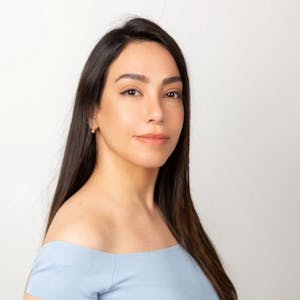Let me see the chat again. Yeah. We have another great question from Nikko. Yeah, just a second. Alex, you can answer this too. For sure. Yeah, sure. Should I, should I go first? Yeah, you can go. I'm just reading. Sure. Um, so just, just before I touched on that one, uh, the previous question as well, in terms of what point during your Salad career, I think I'll touch on it in a bit more detail when I talk about kind of moving into a free dance career. It's definitely important to understand, uh, your own skill set and, and, and be able to marry that up against what the, I guess, what the market's looking for, um, what you're able to do, even as a junior dev, uh, with less than two years experience, uh, there will be, you'll be able to see what other kinds of work is around available for that kind of work as a freelancer. Uh, and as Rodrigo said, uh, as cousin, you can take hourly engagements or smaller, uh, less commitment on, on projects, um, to be able to build up that portfolio, build up that profile so that you are able to then build up into a, uh, if you want it to go into a full time career as a freelancer. Um, in regards to Nico's question, so, um, it might experience. So my, how I moved into freelancing. One of the things that I did was I was working a salary job. Um, and it was, uh, eight or six. So normal work, kind of working office hours. Um, and I picked up a part-time engagement where I worked, uh, with a client in, uh, in the East coast of America, uh, sorry, in the West coast of America. Um, so. The time that started for them there then 9. A.m. was my 5. P.M. Uh, and I was able to negotiate in my employer to be able to work, uh, finished earlier. So I took a shorter, shorter lunch break and finished a bit earlier and work with the client and start a little bit later. So I didn't start with them until six, um, which was fine. And I, and I just worked the four hours in the evening with them. Um, I guess you, you can obviously have the conversation with the client as well. Um, if, if it's a case of, uh, some of that could be done. Uh, asynchronously, uh, I guess for me as a project manager, uh, I needed to be available when the development team were available, but as a developer, um, a lot the work has been asynchronously, and if you can kind of demonstrate you're able to do that, then, uh, that shouldn't be a difficult conversation to have with the client. Yeah. Um, I think I don't have anything else to say. I think you cover it pretty much basic, my, my experience as well. So if you wanted to make this movement from, um, like a normal job to freelancer, you can work again whenever you want, if it's on your midnight or doing your weekends, it's up to you, right? So you can also choose how many hours you want to spend in, in a, in this kind of job. So, again, it's possible and it's totally up to you. Hey Rodrigo. Alex, if I mean, and I think, and I'm just kind of asking for Nico, um, if you do come in now and say, you just put your time at, let's just say 20 hours. I'm just saying that is it, is it going to be harder though to find work? So for me, for me personally, um, as I said, I've been working through top tower for the last three and a half years. Um, and I have only ever taken on part time or hourly, hourly engagements. So I'll say as to why slightly later on, but I can promise you that 20 hours a week, um, is more than feasible. I've not ever had any problem getting work, um, the older projects, and I think clients also. Especially if it's their first foray into freelancing, they may prefer it because they're not committing to a full time salary they're looking at, well, what can this person do over part time? Uh, and they may want to scale it up, which may work for your main not. And if it doesn't, then as I said, I've said your freelancers, we would read I said, um, you could decide to that and move on. Thank you. Um, yeah, just same thing. For example, there is, I believe I can, by my own experience, there is enough work to do. So if you choose to go, like you mentioned, like to start working in a part-time engagement together with your normal work, you can imagine that you're going to need to expand. Uh, at least five extra hours per day, working something else, right? So you need to understand if you're open to that, unless you're going to probably have a lot of things to do and you might not deliver something good. So it's a hard decision to make because working as a freelancer doesn't mean that you need to deliver something again like wherever you have to, it's, it's like one of them, one of the good and best options you have, but you have to deliver something good as well. It's a real work, right? It's not, you are not, we are not playing. We are working professionally and our clients expect you to deliver something real for them. They are expecting that. Otherwise there is no reason to, to work in that way. Um, and Alexei actually posted a question. You guys can read it there. This, this is actually a really interesting question and observation. I don't, if both of you could answer or share your views on that. Yeah, you can go first Alex. Okay, cool. Um, so isn't there a dilemma? Um, I would say no, not for me personally. Um, so a bit about me, um, I have four children, um, between the ages of 12 and four months. Uh, um, so you can imagine all the complexities with that. Uh, and I generally build between 60 and 70 hours a week, uh, on the projects I work on. Um, and. I, I guess it comes down to prioritizing time, balancing time, uh, knowing when I'm able to work, I guess, because I've got a good reputation with Toptal and the clients I work with, um, I'm able to kind of dictate the hours I'll work within reason, um, but as long as the work gets done, the clients are happy. Um, if it comes down to, I guess the other side of it is when it comes down to, uh, it's something I'll talk about later on survival budget or kind of what you want to, uh, you should have an idea of what you want to make as a freelancer. Um, once you exceed that, um, once you achieve that, um, then important to consider the rest of your life as well. Um, as much as I enjoy what I do, um, the reason I do it isn't to benefit of my clients, which is the benefit of my family. Um, and so once I'm able to achieve those goals of my family, then I'm able to kind of make the decision of what's more important to me, whether the extra a hundred dollars or so is important or whether the time with my kids and my partner is.
















Comments